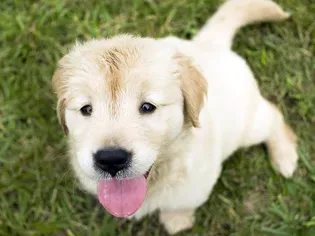How to Stop Your Puppy From Eating Poop
Updated on 04/26/24

How to Stop Your Puppy From Eating Poop: A Comprehensive Guide
As joyous as bringing a new puppy into your home can be, dealing with their peculiar and often unhygienic habits can be a challenge. One of the most common issues new puppy owners encounter is coprophagy, the act of eating poop. While it may seem like a gross and bizarre behavior, coprophagy is actually relatively common in puppies and can be caused by a variety of factors.
In this comprehensive guide, we will delve into the reasons why puppies eat poop and provide you with practical and effective strategies to stop this undesirable behavior.
Why Do Puppies Eat Poop?
Understanding the reasons behind your puppy's coprophagy is crucial for developing an effective solution. Here are some common causes:
* Nutritional deficiencies: Puppies with nutritional deficiencies may seek out poop as a source of missing nutrients. Make sure your puppy's diet is complete and balanced to address this issue.
* Medical conditions: Certain medical conditions, such as pancreatic insufficiency, can cause malabsorption of nutrients, leading to coprophagy. Consult with your veterinarian to rule out any underlying medical issues.
* Boredom and anxiety: Puppies who are bored or anxious may resort to eating poop as a way to self-soothe or relieve stress. Provide your puppy with plenty of attention, interactive toys, and opportunities for exercise to alleviate boredom and anxiety.
* Learned behavior: Puppies may imitate the behavior of adult dogs who eat poop, especially if they are from a home where coprophagy was common. Be consistent with your training and prevent your puppy from observing other dogs who engage in this behavior.
Effective Strategies to Stop Coprophagy
Once you have identified the underlying cause of your puppy's coprophagy, you can implement specific strategies to address it:
* Dietary modifications: If nutritional deficiencies are suspected, consult with your veterinarian to adjust your puppy's diet and ensure it meets all their nutritional needs.
* Medical treatment: If an underlying medical condition is present, treating the condition will typically resolve the coprophagy. Work closely with your veterinarian to manage the medical issue and monitor your puppy's progress.
* Behavioral training: For cases involving boredom or anxiety, implement behavioral training techniques to discourage coprophagy.
* Interrupt and redirect: When you catch your puppy eating poop, interrupt their behavior by clapping your hands or saying a firm "no." Immediately redirect their attention to an alternative activity, such as playing with a toy or going for a walk.
* Positive reinforcement: Reward your puppy with treats or praise every time they choose not to eat poop. This will help them associate avoiding coprophagy with positive experiences.
* Avoid punishment: Never punish your puppy for eating poop, as this will only make them fearful and less likely to stop the behavior. Instead, focus on positive reinforcement and providing them with alternative activities.
* Environmental management: Make sure to keep your puppy's environment clean and free of feces. Regularly remove poop from the yard and indoor areas to reduce the temptation for your puppy to eat it.
Additional Tips:
* Use poop-eating deterrents: There are commercial products available that can be applied to poop to make it unappealing to your puppy. These deterrents typically contain ingredients that have a spicy or bitter taste.
* Supervise your puppy: Keep a close eye on your puppy when they are outside or in areas where they may encounter poop. This will allow you to intervene immediately if they start to exhibit coprophagic behavior.
* Be patient and consistent: Breaking the habit of coprophagy takes time and consistency. Be patient with your puppy and continue to implement the strategies discussed above. With patience and dedication, you can help your puppy overcome this undesirable behavior.
Remember, coprophagy is a common problem that can be successfully addressed with the right approach. By understanding the causes and implementing effective strategies, you can help your puppy break the habit and enjoy a cleaner, healthier lifestyle.
Explore More Pets

Basic Training
Puppy and Baby Introductions

Working Dog Breeds
All About Search and Rescue Dogs

Dog Treatments
Puppy Vaginitis: Signs, Causes and Treatment

Dog Adoption
After More Than 1,200 Days in the Shelter, Coco Goes Home

Basic Training
How to Train Your Puppy to Go on Potty Pads

Hybrid Dog Breeds
The Difference Between a Mutt, Mixed Breed, or Designer Dog?

Dog Treatments
Nail Problems in Dogs

Puppies
7 Reasons Why Two Dogs Are Better Than One